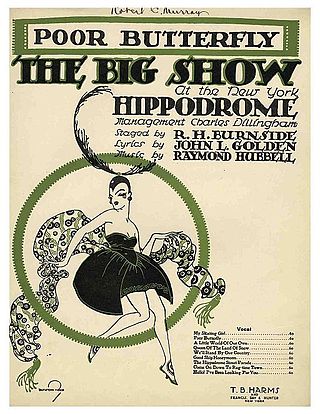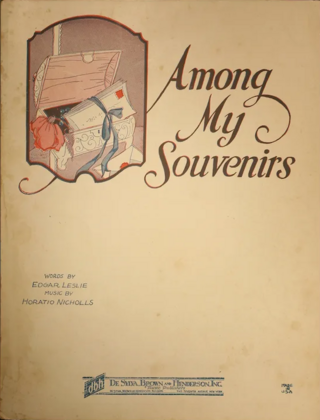Related Research Articles
"How High the Moon" is a jazz standard with lyrics by Nancy Hamilton and music by Morgan Lewis. It was first featured in the 1940 Broadway revue Two for the Show, where it was sung by Alfred Drake and Frances Comstock. In Two for the Show, this was a rare serious moment in an otherwise humorous revue.
The Little Shoemaker" is a popular song based on the French song, "Le petit cordonnier", by Rudi Revil. The original French lyric was written by Francis Lemarque. The English language lyrics were written by Geoffrey Claremont Parsons, Nathan Korb and John Turner.
"Wheel of Fortune" is a popular song written by Bennie Benjamin and George David Weiss and published in 1951. It is best remembered in the 1952 hit version by Kay Starr.
"Blue Tango" is an instrumental composition by Leroy Anderson, written for orchestra in 1951 and published in 1952. It was later turned into a popular song with lyrics by Mitchell Parish. Numerous artists have since covered "Blue Tango".
"On the Atchison, Topeka and the Santa Fe" is a popular song written by Harry Warren with lyrics by Johnny Mercer. The song was published in 1944, spanned the hit chart in mid-1945, and won the 1946 Academy Award for Best Original Song, the first win for Mercer.
"Blues in the Night" is a popular blues song which has become a pop standard and is generally considered to be part of the Great American Songbook. The music was written by Harold Arlen, the lyrics by Johnny Mercer, for a 1941 film begun with the working title Hot Nocturne, but finally released as Blues in the Night. The song is sung in the film by William Gillespie.
"Again" is a popular song with music by Lionel Newman and words by Dorcas Cochran. It first appeared in the film Road House (1948), sung by Ida Lupino. An instrumental rendition was used in the movie Pickup on South Street (1953). By 1949, versions by Vic Damone, Doris Day, Tommy Dorsey, Gordon Jenkins, Vera Lynn, Art Mooney, and Mel Tormé all made the Billboard charts.
"The Poor People of Paris" is a US pop song that became a number-one instrumental hit in 1956. It is based on the French language song "La goualante du pauvre Jean", with music by Marguerite Monnot and words by René Rouzaud. Edith Piaf had one of her biggest hits with the original French version.
"Doctor, Lawyer, Indian Chief" is a popular song published in 1945, with music by Hoagy Carmichael and lyrics by Paul Francis Webster. The title and lyrics are a play on the popular counting game "Tinker, Tailor." The biggest-selling version of the song was recorded by Betty Hutton on June 29, 1945. The recording was released by Capitol Records as catalog number 220. The record first reached the Billboard magazine charts on December 6, 1945 and lasted 17 weeks on the chart, peaking at #1.
"I Dream of You (More Than You Dream I Do)" is a popular song.
"It Might as Well Be Spring" is a song from the 1945 film State Fair. which features the only original film score by the songwriting team of Richard Rodgers and Oscar Hammerstein II. "It Might as Well Be Spring" won the Academy Award for Best Original Song for that year.
"I'm Yours" is a 1952 popular song by Robert Mellin. Recordings of it were made by Eddie Fisher, Don Cornell, The Four Aces, and Toni Arden.
"I Can't Begin to Tell You" is a popular song with music written by James V. Monaco and lyrics by Mack Gordon. The song was published in 1945.
"Serenade of the Bells" is a popular song written by Kay Twomey, Al Goodhart, and Al Urbano and published in 1947.
"Hoop-Dee-Doo" is a popular song published in 1950 with music by Milton De Lugg and lyrics by Frank Loesser.
"That's My Desire" is a 1931 popular song with music by Helmy Kresa and lyrics by Carroll Loveday.

"Poor Butterfly" is a popular song. It was inspired by Giacomo Puccini's opera Madame Butterfly and contains a brief musical quote from the Act two duet Tutti i fior in the verse.
"Let There Be Love" is a popular song with music by Lionel Rand and lyrics by Ian Grant, published in 1940.

"I'm Always Chasing Rainbows" is a popular Vaudeville song. The music is credited to Harry Carroll, but the melody is adapted from Fantaisie-Impromptu by Frédéric Chopin. The lyrics were written by Joseph McCarthy, and the song was published in 1917. It was introduced in the Broadway show Oh, Look! which opened in March 1918. The song was sung in the show by the Dolly Sisters. Judy Garland sang it in the 1941 film Ziegfeld Girl. It was subsequently sung by Jack Oakie in the 1944 film The Merry Monahans and was again featured in the 1945 film The Dolly Sisters, where it was sung by John Payne. It was also included for part of the run of the 1973 revival of Irene. Additionally, the pre-chorus would not have been included until later covers in the 1940s, where the song would gain it's iconic libretti.

"Among My Souvenirs" is a 1927 song with words by Edgar Leslie and music by Horatio Nicholls.
References
- ↑ Song lyric (Moe Jaffe version)
- ↑ Smith, Kathleen E.R. (28 March 2003). God Bless America: Tin Pan Alley Goes to War. The University Press of Kentucky. p. 141. ISBN 0-8131-2256-2.
- ↑ RCA Victor recordings in the 20-1500 to 20-1999 series
- 1 2 3 4 5 Whitburn, Joel (1973). Top Pop Records 1940-1955. Record Research.
- ↑ Columbia Records in the 36500 to 36999 series
- ↑ US Decca records in the 18500 to 18923 series
- ↑ Capitol Records in the 100 to 499 series
- ↑ Majestic Records discography
- ↑ Imperial Records in the 1000 to 1239 series [ permanent dead link ]
- ↑ Citation on Vocal Group Harmony site
- ↑ US Decca records in the 4000 to 4461 series
- ↑ Guild Records discography
- ↑ Rosemary Lane Archived May 5, 2006, at the Wayback Machine
- ↑ See, e.g., .